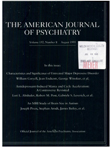Oppositional defiant disorder
Abstract
OBJECTIVE: Oppositional defiant disorder is a common clinical diagnosis that has attracted little research interest, and doubts about its validity as a distinct category remain. However, it underwent substantial changes from DSM-III to DSM-III-R, and more are proposed for DSM-IV. The objective of this study was to review the literature on this condition to establish its place in the psychiatric nosology. METHOD: The terms used in computerized searches of the literature included "oppositional disorder," "oppositional defiant disorder," and "oppositional behavior." Publications found by these searches were supplemented with references in articles, searches in the epidemiological literature, and noncomputerized searches. RESULTS: Findings of studies in which multivariate analyses were used support a distinction between oppositional defiant disorder and conduct disorder. In these studies, one-third of all community-based children with any psychiatric condition had a diagnosis of oppositional defiant disorder and used mental health services often. Symptoms of oppositional defiant disorder appear to be stable over time and to have a developmental profile and sex distribution different from those of conduct disorder. The reliability of the diagnosis is low. CONCLUSIONS: There is some support for oppositional defiant disorder as a category that reflects an oppositional-aggressive psychological dimension, which is different from a delinquent dimension. There is little evidence for making oppositional defiant disorder a part of the construct of conduct disorder and for making "lying" a criterion for it. Considerable impairment should be required for the diagnosis. A more detailed description of symptoms, including a threshold for considering them present, may increase reliability of the diagnosis.
Access content
To read the fulltext, please use one of the options below to sign in or purchase access.- Personal login
- Institutional Login
- Sign in via OpenAthens
- Register for access
-
Please login/register if you wish to pair your device and check access availability.
Not a subscriber?
PsychiatryOnline subscription options offer access to the DSM-5 library, books, journals, CME, and patient resources. This all-in-one virtual library provides psychiatrists and mental health professionals with key resources for diagnosis, treatment, research, and professional development.
Need more help? PsychiatryOnline Customer Service may be reached by emailing [email protected] or by calling 800-368-5777 (in the U.S.) or 703-907-7322 (outside the U.S.).



